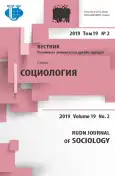Language practices of the Romani community in Serbia: Inclusion or response to the stigma?
- Authors: Petrović J1
-
Affiliations:
- University of Niš
- Issue: Vol 19, No 2 (2019)
- Pages: 212-221
- Section: Sociology in Serbia
- URL: https://journal-vniispk.ru/2313-2272/article/view/340354
- DOI: https://doi.org/10.22363/2313-2272-2019-19-2-212-221
- ID: 340354
Cite item
Full Text
Abstract
The results of the research presented in the article are part of the findings of the study conducted in 2014 within the project Social and Cultural Potential of the Romani Ethnic Community in Serbia. The survey was based on the stratified sample of 1,212 respondents and conducted by a team of researchers representing four universities of Serbia. One of the aims of the research was to identify the prevailing language practices of the Romani community in Serbia. The paper presents the results of the study of the attitudes of the Romani to the use of language and their language practices focusing on such issues as the assessment of the importance of the Romani language in expressing their identity, the use of the Romani language in everyday communication in various social contexts, and the estimates of the significance of this symbolic capital in education as expressed in the parents ideas and attempts to ensure that their children are educated in their mother tongue. The results of the survey proved that the Romani community’s attitudes to language and language practice are an expression of the general social position of this group, i.e. a minority ethnic group in the Serbian society. Therefore, its language practices are determined by the need to preserve the Romani community’s identity and by uneven distribution of social power between majority and minority communities. Thus, social power (or powerlessness) ensures legitimacy for the use of a specific language in certain social situations. Considering the Romani ethnic community, the use of the mother tongue is reduced to the domain of private communication with some of the Romani people renouncing the use of their native language and hiding their ethical identity. The study proves that linguistic mimicry serves as a way to avoid social stigmatization.
Keywords
About the authors
J Petrović
University of Niš
Author for correspondence.
Email: jasminafilfak1@gmail.com
-
Ćirila and Metodija, 2, Niš, Serbia, 18000References
- Analysis of the Application of Affirmative Measures in the Romani Education, and Recommendations for Improving Measures. Beograd; 2016 (In Serbian).
- Baucal A., Stojanović J. Indicators of Equal Access to the Quality Education for the Romani. Beograd; 2010 (In Serbian).
- Bourdieu P. Language and Symbolic Power. Cambridge; 1991.
- Đorđević D.B. Romanipen - the basis of cultural policy and cooperation of the Balkan Romani. Lj. Mitrović, D.B. Đorđević, D. Todorović (Eds.). Models of Cultural Policy in the Multicultural Societies of the Balkans and under the euro-integration. Niš; 2004 (In Serbian).
- Đorđević D. On Horseback with a Laptop in the Saddlebag - Introduction to Romani Studies. Niš; 2010 (In Serbian).
- Đurović B. Social segregation and ghettoized awareness of the Romani. M. Macura (Ed.). The Gypsies/Romani in the Past and Today. Beograd; 1996 (In Serbian).
- Grenfell M. Bourdieu, language, and literacy. Reading Research Quarterly. 2009; 44 (4).
- Haliti B. Serbian-Romani Dictionary. Novi Sad; 2001.
- Jakšić B. Policy of changing the identity of the Romani in Serbia. T. Varadi, G. Bašić (Eds.). Changing the Identity, Culture and Language of the Romani under the Planned Social-Economic Integration. Beograd; 2012 (In Serbian).
- Law on the Protection of the Rights and Freedoms of National Minorities. Službeni list SRJ, br. 11/2002, Službeni list SCG, br. 1/2003, 72/2009, 97/2013 i 47/2018 (In Serbian).
- Lazar Ž., Koković D. Ethnic distance in Vojvodina (results of the research). Sociološki Pregled. 2005; 39 (3) (In Serbian).
- Miladinović S. Ethnic and social distance to the Romani. Sociološki Pregled. 2008; 42 (3) (In Serbian).
- Mitrović A. At the Bottom: The Romani on the Poverty Line. Beograd; 1990 (In Serbian).
- Mitrović A. The position of the Romani in society - a possible approach to the research of the Romani population. M. Macura, V. Stanovčić (Ed.). The Position of Minorities in the Federal Republic of Yugoslavia. Beograd; 1996 (In Serbian).
- Mitrović А., Zajić G. Social status of the Romani in Serbia. The Romani in Serbia. Beograd; 1998 (In Serbian).
- Petrović J., Šuvaković U. Social distance of students of Serbia, Macedonia and Bulgaria to the Romani. Godišnjak za Sociologiju. 2016; 11 (14-15) (In Serbian).
- Raduški N. Social-demographic and ethnic characteristics of the Romani in Serbia. Sociološki Pregled. 2003; 37 (3-4) (In Serbian).
- Sokolovska V. On the research methodology and sample. V. Sokolovska (Ed.). Social and Cultural Potentials of the Romani in Serbia. Novi Sad; 2014 (In Serbian).
- Sokolovska V., Jarić I. Educational and economic status of the Romani in Serbia and its regional distribution. Sociološki Pregled. 2014; 48 (3) (In Serbian).
- Todorović D. The Romani in the Balkans and Serbia. Teme. 2011; 35 (4) (In Serbian).
Supplementary files









